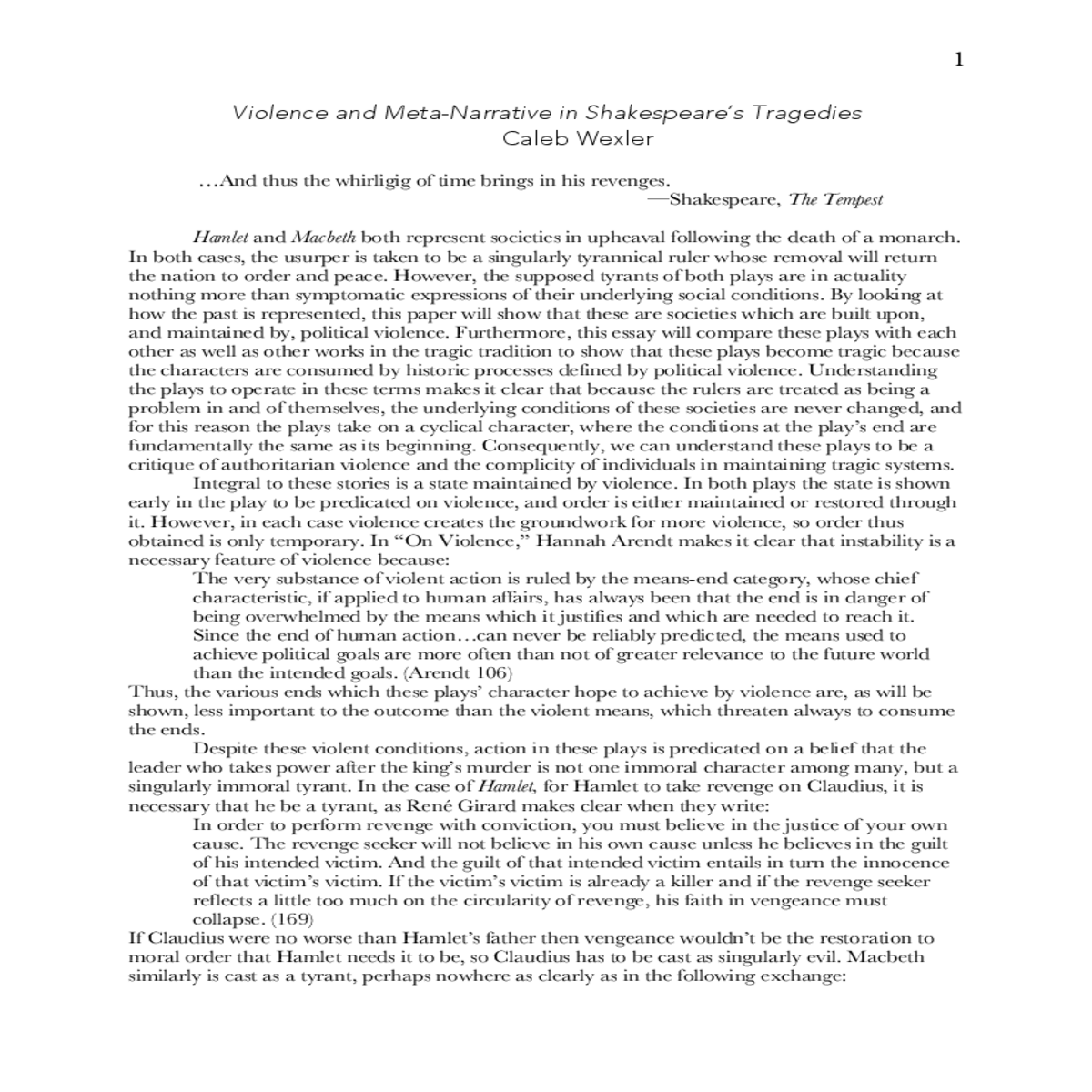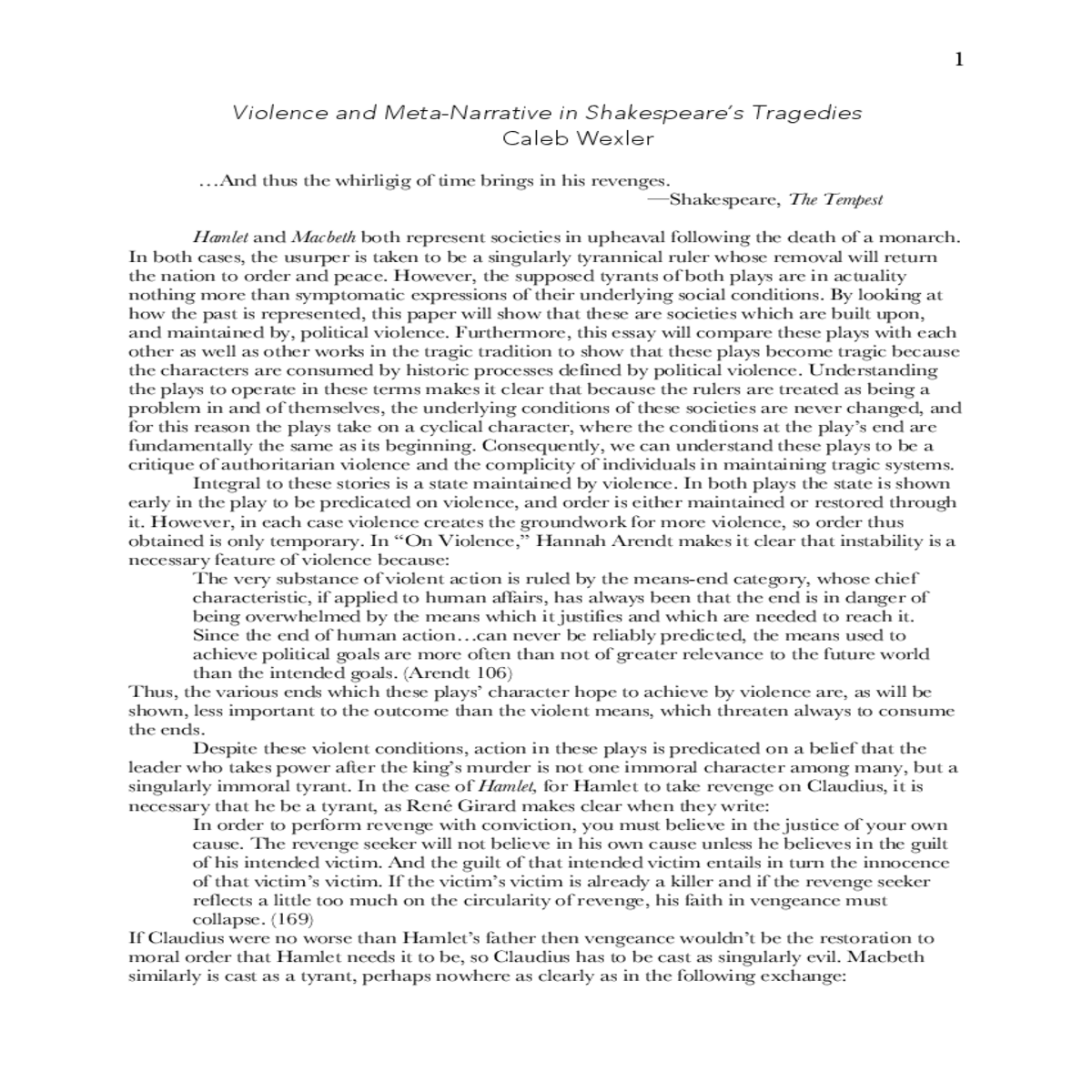The absolute passion and dedication demanded hamlet
1
Violence and Meta-Narrative in Shakespeare’s Tragedies Caleb Wexler
Since the end of human action…can never be reliably predicted, the
means used to achieve political goals are more often than not of greater
relevance to the future world than the intended goals. (Arendt
106)
Thus, the various ends which these plays’ character hope to achieve by
violence are, as will be shown, less important to the outcome than the
violent means, which threaten always to consume the ends.
Despite these violent conditions, action in these plays is predicated
on a belief that the leader who takes power after the king’s murder is
not one immoral character among many, but a singularly immoral tyrant.
In the case of Hamlet, for Hamlet to take revenge on Claudius,
it is necessary that he be a tyrant, as René Girard makes clear when
they write:
In order to perform revenge with conviction, you must believe in the
justice of your own cause. The revenge seeker will not believe in his
own cause unless he believes in the guilt of his intended victim. And
the guilt of that intended victim entails in turn the innocence of that
victim’s victim. If the victim’s victim is already a killer and if the
revenge seeker reflects a little too much on the circularity of revenge,
his faith in vengeance must collapse. (169)
If Claudius were no worse than Hamlet’s father then vengeance wouldn’t
be the restoration to moral order that Hamlet needs it to be, so
Claudius has to be cast as singularly evil. Macbeth similarly is cast as
a tyrant, perhaps nowhere as clearly as in the following exchange:
Looking at the succession of rulers, we see that violence doesn’t restore order, rather it imposes a cyclical structure on the plays. Let us begin with the rule of Prince Hamlet’s father, Hamlet the Dane. What little we learn of the king’s rule is related in the remembrances of Horatio in 1.1. He was a conqueror who expanded Denmark’s rule through war, as when he killed King Fortinbras. King Hamlet was so defined by warfare in life, that in death he wears “the very armor he had on / When he the ambitious Norway combated” (1.1.59-60). Therefore the defining feature of Hamlet the Dane, and by extension the Danish state, is violence. Claudius similarly begins his rule with the murder of his brother, and later plots to have Hamlet killed in order to maintain the security of his rule. This of course sets the stage for the revenge plot, as well as the deaths of Rosencrantz, Guildenstern, and Laertes. Furthermore, in the bloodbath of 5.2, the means-end threat that Arendt identified comes to fruition. The supposed ends were the maintenance of political order (in Claudius’s case), or the restoration of moral order (in Hamlet’s case) but these are entirely subsumed by violence. The only suitable heir to this violent world is the young Fortinbras who, on his own quest for revenge, has brought his army to Denmark. This is why Hamlet, conscious of the chain of violence that defines Denmark’s history, uses his dying breaths to vote for Fortinbras as the next ruler of Denmark. Thus the play ends with the essential violent structure of rule unchanged, and with another warlike ruler taking the throne.
When we consider Macbeth alongside Hamlet, we see that it functions in a very similar way, and some of the stranger elements become clear. In particular, Macduff’s insistence of Macbeth’s absolute evil appears inscrutable. He has not yet received the news of his family’s death, so he has no personal motive against the king. Any vice of Macbeth’s which we might imagine has turned Macduff against him, Malcolm promises to surpass. So why is Macduff still so insistent that
4
Even for an eggshell. (4.1.46-52)
What Hamlet admires here in Fortinbras is the kind of character with
which the late king was described, that of a martial conqueror who goes
to war even for the sake of “an eggshell”. Given this description, we
might very well suppose that he would be the same sort of authoritarian
ruler as the elder Hamlet. Like Fortinbras in Act 5, Malcolm enters the
action at the head of an army, casting himself, depending on
perspective, as either the avenging hero or another usurper. What, more
than anything, defines his rule is the looming presence of Fleance. Any
analysis of Macbeth’s conclusion must pay heed to this one
detail because Fleance’s importance cannot be overstated.
5
require the crime of matricide, and while he does follow through on the mission of vengeance which was dictated to him, he has to flee Athens pursued by the furies (Oresteia). Here we see the guilt of the mother, the moral question, the supernatural intervention, and the denial of a happy ending, all of which are critically missing from the historical account of Amleth. We can see how elements of Hamlet, namely the ambiguity of Gertrude’s guilt, and the role of the brother, not the wife, as murderer, are midpoints between these two stories, which arise from the The Libation Bearers being mediated by the historical events of Amleth.
Having come to understand the function of history in this way, we can now return to the issue of cyclicality with which we began. As I previously argued, the villains in these plays are treated as singular, violent aberrations, even though they echo the actions of the rulers before them. Now that I’ve explicated the underlying historical conditions, I want to return to this point and revise it to say that the tyrants do not only echo those before them, but exist as symptoms of the whole system which gave rise to them. So when Marcellus attests, “Something is rotten in the state of Denmark” (Hamlet 1.40.90) we must realize that the rot goes deeper than Claudius’s particular crime of murder. The tragedy begins as the result of the historical structures of violence and the prevailing forms of rule, and the tragedy reproduces itself through the failure of the characters to change either these historical patterns or the forms of rule. The would-be heroes engage in “…changing [not] the world (or the system), but only its personnel” (Arendt 123). So when Hamlet ends the tyranny of Claudius, an authoritarian society remains, ready for Fortinbras to take his place; when Macduff and Malcolm overthrow Macbeth, the world is still one driven by violence and Fleance is waiting in the wings to begin the cycle anew. As a result, the tragedy implicates all of its characters, hero and villain alike, in the maintenance of the tragic meta-narrative, and in any tragedy which sought true moral restoration, the hero would have to directly grapple with this meta-narrative.
In the final analysis, we see that Hamlet and
Macbeth have at their centers the same driving historical
forces, the same meta-narrative in which all the particular narratives
of their characters are organized and related to one another. It is a
narrative of violence, particularly political, authoritarian violence,
which gives rise to specific tyrants, but is never overthrown with them
because each violent reversal is just another turn in the violent cycle.
Having developed this vision of Hamlet and Macbeth we
might, in the future, consider how the whirligig of time spins at the
heart of other tragedies, as well as how works in other genres relate to
similar issues of authoritarian violence—which are certainly present in
Egeus’s filicidal threats in A Midsummer Night’s Dream, in the
paranoid tyranny of Leontes in The Winter’s Tale, and in the
gulling of Malvolio in The Twelfth Night, from which I’ve
borrowed the phrase “the whirligig of time”, to name but a few—without
descending into tragedy. We might even use these lessons from
Shakespeare to contextualize how we consider the tyrants that manifest
in our own political world and the extent to which we treat them either
as unique villains or as more deeply
symptomatic of historical processes.
Greenblatt, Stephan, Walter Cohen, Suzanne Gosset, Jean E. Howard, Katherine Eisaman Maus, and Gordon McMullan, editors. The Norton Shakespeare. 3rd ed., Norton, 2016.
Rushdie, Salman. The Golden House. Random House, 2017.





